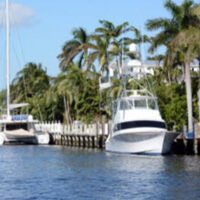Florida’s Boating Safety Regulations: What Every Boater Needs to Know

Florida implemented a comprehensive set of boating safety regulations for the safety of all who navigate its waters. Whether you are a resident or a visitor to Florida, understanding these laws is crucial to enjoying a safe and legal boating experience. Here, we outline the essential boating laws and safety regulations specific to Florida that every boater needs to know.
Boater Education Requirements
One of the foundational elements of boating safety in Florida is the requirement for boater education.
Boating Safety Education ID Card: Anyone born on or after January 1, 1988, must have a Boating Safety Education Identification Card to operate a motorboat with ten horsepower or more. This card is obtained by completing a National Association of State Boating Law Administrators (NASBLA) approved boating safety course and is valid for life.
Equipment and Safety Gear
Proper equipment is essential for safety on the water. Florida law mandates that all vessels must be equipped with specific safety gear.
Life Jackets: Each vessel must carry one U.S. Coast Guard-approved life jacket for each person on board. Children under the age of six must wear a life jacket at all times while on vessels under 26 feet in length. There must also be one readily available throwable type personal flotation device on the vessel. This is known as a USCG “Type IV” PFD.
Sound-Producing Devices: Vessels must have a horn, whistle, or other sound-producing device to signal intentions and warn other boaters.
Fire Extinguishers: Depending on the size of the vessel, one or more fire extinguishers must be on board. They must be readily accessible and fully charged.
Visual Distress Signals: Vessels operating in coastal waters must have visual distress signals, such as flares, to signal for help in an emergency.
Vessel Operation and Navigation Rules
Florida enforces strict rules regarding the operation and navigation of vessels to prevent accidents and ensure smooth boating traffic.
Speed Limits and No-Wake Zones: Speed limits vary by location and are strictly enforced, especially in manatee protection zones and nearshore areas. No-wake zones require boaters to travel at the slowest speed possible while still maintaining steerage.
Navigation Rules: Boaters must adhere to the “rules of the road,” which include proper navigation lights during nighttime operation, yielding the right of way, and maintaining a proper lookout.
Operating Under the Influence: In Florida it is illegal to operate a vessel while under the influence of alcohol or drugs. The blood alcohol limit is 0.08%, similar to the regulations for driving a motor vehicle.
Registration and Titling
All motorized vessels operated on Florida waters must be registered and titled with the Florida Department of Highway Safety and Motor Vehicles (FLHSMV).
Registration: Vessels must display a current registration decal and the vessel’s registration number on both sides of the bow.
Titling: New vessels, or those brought into Florida from another state, must be titled within 30 days of purchase. Title certificates are necessary for proving ownership and facilitating the sale or transfer of the vessel. It is important that the owner of the vessel have the title registered with the State of Florida because Florida looks to the registered owner as being responsible for the vessel. (It is very important that sale documents are completed by the new owner.)
Environmental Protection
Protecting Florida’s waterways and marine life is a critical aspect of the State’s boating regulations.
Manatee Zones: Florida is home to a large population of manatees, which are protected by state and federal law. Boaters must adhere to speed zones designed to protect these gentle giants, especially in designated manatee areas.
Discharge of Pollutants: It is illegal to discharge any pollutants, including oil, trash, or sewage, into Florida waters. To prevent pollution, vessels with installed toilets must have a Coast Guard-approved marine sanitation device (MSD).
Emergency Procedures
Being prepared for emergencies is a key component of boating safety.
Accident Reporting: Boaters must report accidents that result in serious injury, death, or significant property damage to the Florida Fish and Wildlife Conservation Commission (FWC). Timely reporting is crucial for legal and insurance purposes. And, the US Coast Guard requires form 2692 to be completed where there is substantial injury or vessel damage in an incident.
Emergency Contacts: Boaters should have a list of emergency contacts, including local Coast Guard and FWC numbers, and a plan for contacting them in case of an emergency.
Contact www.888BOatLaw.com. Frank D. Butler, PA
Figuring out Florida’s boating safety regulations and laws is complex, and that is why it is important to choose a specialist in boating injury cases. If you have questions about these laws or find yourself involved in a boating accident, experienced legal advice makes a significant difference. Contact www.888BoatLaw.com, Frank D. Butler, PA, for experienced guidance and representation. Our firm specializes in boating, maritime, and admiralty law, ensuring that you are best-informed and protected on Florida’s waters. Reach out to us today for a consultation.
Sources:
leg.state.fl.us/statutes/index.cfm?App_mode=Display_Statute&URL=0300-0399/0327/0327ContentsIndex.html&StatuteYear=2019&Title=-%3e2019-%3eChapter%20327
leg.state.fl.us/statutes/index.cfm?App_mode=Display_Statute&URL=0300-0399/0328/0328ContentsIndex.html&StatuteYear=2019&Title=-%3e2019-%3eChapter%20328
